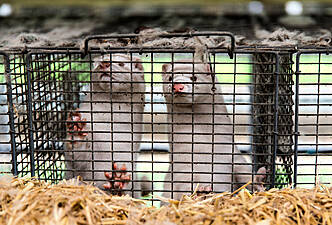A new coronavirus strain that has spread from mink to humans does not look as though it will currently stop Covid-19 vaccines from working, Dr Anthony Fauci has said.
The top US government scientist said the issue needs to be taken seriously but indications at the moment were that the mutations would not derail plans for mass vaccination.
Mutations in coronavirus have triggered the cull of millions of farmed mink in Denmark after authorities found genetic changes they said might undermine the effectiveness of Covid-19 vaccines.
More than 200 people have been infected with mink-related coronavirus, leading the UK to ban non-UK citizens coming to the country from Denmark.
The genetic change is in the spike protein of the virus which is a key target for vaccines, according to Danish scientists.
In a Chatham House briefing, Dr Fauci said: “Whenever you see something like that you need to pay attention to it. You certainly can’t just blow it off.
“You have got to look at it, you have got to take a look at what it means, what the mutation has to do with various aspects of the molecules that are responsible for the binding of antibodies.
“We took a first look, the group here in our vaccine research centre, who takes this very seriously, and [they say] that when you look at the binding sites …
“It does not appear at this point that the mutation that has been identified in the minks is going to have an impact on vaccines and the effect of vaccine-induced immune response.
“It might have an impact on a certain [number] of the monoclonal antibodies that are developed against the virus – we don’t know that yet.
“But at first cut it doesn’t look like something that’s going to be a really big problem for the vaccines that are currently being used to induce an immune response.”
'Promiscuous' virus
His comments come as Jeremy Farrar, director of the Wellcome Trust, told a separate briefing the reason the mink mutation was worrying was because it showed the virus was “promiscuous”.
He said: “The reason why this is so worrying is it shows how promiscuous this virus is and that it is very able to leap from certainly bats and then probably some intermediate host in China at some point in 2019 and come across (to) the humans.
“And what the minks demonstrate to us and reminds us of – is that it can go back the other way.
“It can then become an endemic animal virus as well and minks are … essentially the canary in the coal mine for this.
“They’re telling us that this virus can jump back and forth between humans and animals.”
He said the virus could easily get established in other animal populations such as rats, mice, ferrets and voles.
It could then “come back in future years into the human population as a revolving door in a way”, he said.
“That’s the worry of the mink story, rather than the minks themselves.”
Mr Farrar said he thought “epidemics are the horrible poster child of the things we’re going to face in the 21st century.”
The drivers of epidemics including changes in animal and human behaviour, trade and travel and climate change, meant that issues such as epidemics and drug resistance were “not going to be national”, he said.
He said countries over the last five to 10 years were “locked in to what I describe as the abyss of nationalism” but Covid had shown the need for international cooperation and collaboration.
“Humanity has looked at itself and said we have to work together as a world and I think the scientists around the world have actually driven that through Covid – they’ve worked, they’ve collaborated, they’ve shared their information and I think that is to be applauded and and shows us a way through,” he said.
Asked if he agreed with Prof John Bell from Oxford University that things could return to normal by spring, Mr Farrar replied: “John’s Canadian I think originally.
“Spring can last a long time in Canada, and, you know, it’s good of John to have not become too fixed on an absolute date.”
But he added: “I do think we’re at a fork in the road.
“I’ve said since January that the way through this pandemic is ultimately going to be through science and innovation.”
Mr Farrar said news that Pfizer’s Covid vaccine can protect people from getting ill was “a huge finding – it’s not just abstract immunology, this is protecting people.”

He added: ” I think we’ll look back on the advances made in 2020 and say that was a moment when science really did make a leap forward.”
But Sir Jeremy said he still believes the current coronavirus “is now part of humanity, it is an endemic infection now, and I don’t think it’s going to go away”.
He added: “But I’m damned glad that we will have drugs and vaccines and diagnostics to help us through that, as with every other infection.”







